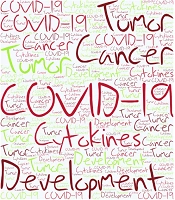Cytokines are involved in and have an effect on the clearance of pathogenic viruses and bacteria in the host defense system in opposition to infections. There is a higher risk of infections among patients who have cancer on account of immunosuppression resulting from immune factors mediated by cancer and systemic treatment. Therefore, higher susceptibility to the development of Coronavirus disease 2019 (COVID-19) was observed among subjects suffering from cancer, particularly cases with advanced disease or hematological malignancies (1-3). As an example, a severe form of COVID-19 was announced among hospitalized cases with cancer in the first outbreak in Wuhan, China, than those without cancer, accompanied by a higher frequency of intensive care unit stay, need for invasive ventilation, and a higher rate of death. The aforementioned findings are in line with the findings of an investigation, following adjustment for age and other comorbidities, announcing higher incidence of the severe disease among cancer cases, mainly in hematological and lung malignancies and all cancers with metastasis in stage IV (1-3).
It was reported that some pro-inflammatory cytokines [e.g., interleukin 6 (IL-6) and tumor necrosis factor-alpha (TNF-α)] vastly upregulated in severe acute respiratory syndrome Coronavirus 2 (SARS-CoV-2) infection are also factors that cause tumor promotion, thereby changing cancer progression rate. Furthermore, previously higher levels of cytokines (e.g., IL-6 and TNF-α) in cancer subjects might cause to protect in the starting phases of SARS-CoV-2 infection, providing a precise level of immune-preparedness. To date, a limited number of studies have examined this issue among fragile cancer patients (4).
In this regard, De Winter et al. designed a study that ambulatory patients with cancer scheduled for routine blood testing during the COVID-19 pandemic, including 52 exposed and 54 unexposed to SARS-CoV-2, were studied alongside 15 exposed and 42 unexposed healthcare workers from the oncology units. All participants underwent serial CCG immunoassays from whole blood samples, with healthcare workers assessed at baseline and after 1, 2, and 3 months. Clinical data, including peak disease severity on the World Health Organization COVID-19 ordinal scale, were gathered. Patients were divided into solid (n = 36 for exposed, n = 32 for unexposed) and hematologic (n = 16 for exposed, n = 22 for unexposed) cancers. Changes in CCG concentrations over time were determined. The results showed that unexposed patients with cancer were found to have increased levels of 35 CCGs, compared to unexposed healthcare workers, with no significant differences between patients with solid and hematologic cancers. Among the 19 CCGs common to both cancer types were cytokines, for example, IL-6, interleukin-1 receptor antagonist, interleukin 17A, TNF-α, and vascular endothelial growth factor, and less well-described cytokines and chemokines, for example, fractalkine, T-cell chemokine CTACK, and tyrosine kinase 2 with immunoglobulin-like and epidermal growth factor homology domain. Exposed patients with cancer were found to have seven CCGs that were additionally significantly altered, compared to healthcare workers. Of these, TNF-alpha, IFN-beta, thymic stromal lymphopoietin (TSLP), and circulating vascular cell adhesion molecule-1, increasing in subjects with hematologic cancers, are recognized as the factors that cause tumor promotion. According to longitudinal examination during 3 months, it was shown that CCGs (e.g., TNF-α, interleukin 2 (IL-2), and monocyte chemotactic protein-3 (MCP-3)] remained elevated in exposed subjects who have cancer, but not in healthcare workers. In patients with hematologic malignancies, the levels of IL-2 and MCP-3 were found to temporarily increase during follow-up (5). Therefore, it is concluded that essentially high degrees of inflammatory cytokines/chemokines and angiogenic and other growth factors are reported among subjects suffering from cancer that rapidly increase remarkably following SARS-CoV-2 infection, particularly in cases with hematological malignancy. Additionally, although cytokine profiles in those who have solid tumors were gradually stabilized, a continuous dysregulated immune response was observed among individuals suffering from hematological malignancies persisting for up to 3 months within the study duration. Since some investigated cytokines/chemokines and growth factors in the present study are also the factors that cause tumor promotion, the collected data of this study necessitate increased alertness in hematological malignancy subjects with SARS-COV-2 infection as a component of long COVID-19 surveillance (5).
Therefore, cancer patients exposed to SARS-CoV-2 infection experience persistent increases in cytokines, chemokines, and (angiogenic) growth factors (CCGs) over and above those seen in unexposed patients, indicating a Belgian analysis of serial blood samples which can lead to tumor development in cancer patients (6).
To sum up, infectious disease physicians, especially those treating immunocompromised patients, should perform regular follow-up, serial monitoring of inflammatory factors, and polymerase chain reaction in these patients and patients with lung involvement in order to prevent tumor development.
